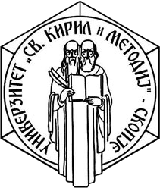| Professor |
Course |
Semester |
ECTS |
|
| 1 | assoc. prof. Ana Madevska Bogdanova, assoc. prof. Marija Mihova, assist. prof. Anastas Mishev, assist. prof. Boro Jakimovski |
Advanced algorithms |
IX |
6 |
| 2 | assist. prof. Boro Jakimovski, elect. assist. prof. Jasen Markovski | Formal methods | IX | 6 |
| 3 | prof. Vancho Kusakatov, prof. Margita Kon-Popovska, assist. prof. Vesna Dimitrievska Ristovska |
Optimization |
IX |
6 |
| 4 |
Elective course |
IX |
6 |
|
| 5 |
Elective course |
X |
6 |
|
| 6 | Elective course | X | 6 | |
| 7 | Elective course | X | 6 |
Intelligent Systems Engineering (4+1)
Intelligent Systems Engineering (4+1)
- Offered by: Ss. Cyril and Methodius University - Skopje, Faculty of Computer Science and Engineering – FCSE
- Study programme: Intelligent Systems Engineering – bioinformatics / robotics
- Scientific-research field: Engineering, Natural sciences and applied mathematics
- Category: Informatics
- Sub-category: Other
- The master studies cycle consists of 60 ECTS.
- Study duration: 2 semesters
- One academic year is divided into two semesters with 30 weeks each (1 semester = 15 weeks)
- Enrollment requisites: fully completed undergraduate study cycle with a minimum of 240 ECTS with a degree in the fields of computer science and/or computer engineering. In the case of having an appropriate degree with less than 240 ECTS, the student has to enroll the introductory courses first.
- Introductory courses: only for students that have obtained less than 240 ECTS. A number of differential introductory courses are offered in order to level up the required competences. Upon successful completion of the introductory courses, the student has the right to continue with the formal master study programme courses in the second year of studies.
- First semester: 3 compulsory courses + 2 elective courses (one of the elective courses can be chosen from the courses list offered by the University)
- Second semester: 1 compulsory course + 1 elective course (can be chosen from the courses list offered by the University only in the event that this opportunity has not been used in the previous semester) + final master thesis project that equals 18 ECTS.
- 1 ECTS = 30 hours of work load.
- Contact hours per week is 4.
2. Studies
| Professor | Course |
Semester |
ECTS |
|
| 1 | prof. Smile Markovski, assoc. prof. Ana Madevska Bogdanova |
IX |
6 | |
| 2 | assist. prof. Nevena Ackovska , assoc. prof. Marija Mihova | Information processing in biological systems | IX | 6 |
| 3 | prof. Sasho Panov | Molecular biology of the cell |
IX |
6 |
| 4 |
Elective course |
IX |
6 |
|
| 5 | Elective course |
IX |
6 |
|
| 6 | assoc. prof. Ana Madevska Bogdanova, prof. Zaneta Popeska | Data mining for bioinformatics | X | 6 |
| 7 | Elective course | X | 6 |
| Professor |
Course |
Semester |
ECTS |
|
| 1 | prof. Smile Markoski, assoc. prof Ana Madevska Bogdanova |
IX |
6 | |
| 2 | assist. prof. Nevena Ackovska, assoc. prof. Marija Mihova | Information processing in biological systems | IX | 6 |
| 3 | assoc. prof. Andrea Kulakov, assist. prof. Nevena Ackovska |
IX |
6 |
|
| 4 |
Elective course |
IX |
6 |
|
| 5 |
Elective course |
IX |
6 |
|
| 6 | assoc. prof. Ana Madevska Bogdanova, assist. prof. Gjorgji Madzarov | Machine learning | X | 6 |
| 7 | Elective course | X | 6 |


